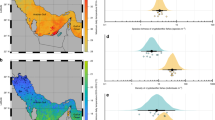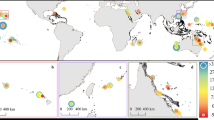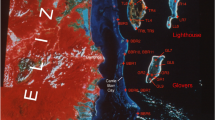Abstract
Experiments have shown that ocean acidification due to rising atmospheric carbon dioxide concentrations has deleterious effects on the performance of many marine organisms1,2,3,4. However, few empirical or modelling studies have addressed the long-term consequences of ocean acidification for marine ecosystems5,6,7. Here we show that as pH declines from 8.1 to 7.8 (the change expected if atmospheric carbon dioxide concentrations increase from 390 to 750 ppm, consistent with some scenarios for the end of this century) some organisms benefit, but many more lose out. We investigated coral reefs, seagrasses and sediments that are acclimatized to low pH at three cool and shallow volcanic carbon dioxide seeps in Papua New Guinea. At reduced pH, we observed reductions in coral diversity, recruitment and abundances of structurally complex framework builders, and shifts in competitive interactions between taxa. However, coral cover remained constant between pH 8.1 and ∼7.8, because massive Porites corals established dominance over structural corals, despite low rates of calcification. Reef development ceased below pH 7.7. Our empirical data from this unique field setting confirm model predictions that ocean acidification, together with temperature stress, will probably lead to severely reduced diversity, structural complexity and resilience of Indo-Pacific coral reefs within this century.
This is a preview of subscription content, access via your institution
Access options
Subscribe to this journal
Receive 12 print issues and online access
$209.00 per year
only $17.42 per issue
Buy this article
- Purchase on Springer Link
- Instant access to full article PDF
Prices may be subject to local taxes which are calculated during checkout




Similar content being viewed by others
References
Feely, R. et al. Impact of antropogenic CO2 on the CaCO3 system in the oceans. Science 305, 362–366 (2004).
Doney, S. C., Fabry, V. J., Feely, R. A. & Kleypas, J. A. Ocean acidification: The other CO2 problem. Annu. Rev. Mar. Sci. 1, 169–192 (2009).
Kroeker, K. J., Kordas, R. L., N, C. R. & Singh, G. G. Meta-analysis reveals negative yet variable effects of ocean acidification on marine organisms. Ecol. Lett. 13, 1419–1434 (2010).
Hendriks, I. E., Duarte, C. M. & Alvarez, M. Vulnerability of marine biodiversity to ocean acidification: A meta-analysis. Estuar. Coast. Shelf Sci. 86, 157–164 (2010).
Kleypas, J. A. et al. Geochemical consequences of increased atmospheric carbon dioxide on coral reefs. Science 284, 118–120 (1999).
Hoegh-Guldberg, O. et al. Coral reefs under rapid climate change and ocean acidification. Science 318, 1737–1742 (2007).
Hall-Spencer, J. et al. Volcanic carbon dioxide vents show ecosystem effects of ocean acidification. Nature 454, 96–99 (2008).
IPCC Climate Change 2007: Synthesis Report (eds Pachauri, R.K. & Reisinger, A.) (Cambridge Univ. Press, 2007).
Hönisch, B. et al. Atmospheric carbon dioxide concentration across the mid-Pleistocene transition. Science 324, 1551–1554 (2009).
Orr, J. C. et al. Anthropogenic ocean acidification over the twenty-first century and its impact on calcifying organisms. Nature 437, 681–686 (2005).
Key, R. M. et al. A global ocean carbon climatology: Results from Global Data Analysis Project (GLODAP). Glob. Biogeochem. Cycles 18, GB4031 (2004).
Langdon, C. & Atkinson, M. Effect of elevated pCO2 on photosynthesis and calcification of corals and interactions with seasonal change in temperature/irradiance and nutrient enrichment. J. Geophys. Res. 110, C09S07 (2005).
Atkinson, M. J. & Cuet, P. Possible effects of ocean acidification on coral reef biogeochemistry: Topics for research. Mar. Ecol. Prog. Ser. 373, 249–256 (2008).
Cigliano, M. et al. Effects of ocean acidification on invertebrate settlement at volcanic CO2 vents. Mar. Biol. 157, 2489–2502 (2010).
Lough, J. M. Coral calcification from skeletal records revisited. Mar. Ecol. Prog. Ser. 373, 257–264 (2008).
De’ath, G., Lough, J. M. & Fabricius, K. E. Declining coral calcification on the Great Barrier Reef. Science 323, 116–119 (2009).
Manzello, D. P. Coral growth with thermal stress and ocean acidification: Lessons from the eastern tropical Pacific. Coral Reefs 29, 749–758 (2010).
Reynolds, R. W. et al. An improved in situ and satellite SST analysis for climate. J. Clim. 15, 1609–1625 (2002).
Krief, S. et al. Physiological and isotopic responses of scleractinian corals to ocean acidification. Geochim. Cosmochim. Acta 74, 4988–5001 (2010).
Wilson, S. K. et al. Habitat degradation and fishing effects on the size structure of coral reef fish communities. Ecol. Appl. 20, 442–451 (2010).
Manzello, D. et al. Poorly cemented coral reefs of the eastern tropical Pacific: Possible insights into reef development in a high-CO2 world. Proc. Natl Acad. Sci. USA 105, 10450–10455 (2008).
Feely, R. A., Doney, S. C. & Cooley, S. R. Ocean acidification: Present conditions and future changes in a high-CO2 world. Oceanography 22, 36–47 (2009).
Dickson, A. G., Sabine, C. L. & Christian, J. R. (eds) Guide to Best Practices For Ocean CO2 Measurements 191 (PICES Special Publication 3, 2007).
Lewis, E. & Wallace, D. W. R. Program developed for CO2 system calculations’. Report No. ORNL/CDIAC-105, (US Department of Energy, Oak Ridge, Tennessee, 1998).
Jonker, M., Johns, K. & Osborne, K. Surveys of benthic reef communities using underwater digital photography and counts of juvenile corals. (Australian Institute of Marine Science, 2008).
Siebeck, U. E., Marshall, N. J., Klueter, A. & Hoegh-Guldberg, O. Fine scale monitoring of coral bleaching using a colour reference card. Coral Reefs 25, 453–460 (2007).
Sampayo, E. M., Dove, S. & Lajeunesse, T. C. Cohesive molecular genetic data delineate species diversity in the dinoflagellate genus Symbiodinium. Mol. Ecol. 18, 500–519 (2009).
Wood, S. N. Generalized Additive Models: An Introduction with R (Chapman and Hall/CRC Press, 2006).
McCullagh, P. & Nelder, J. A. Generalized Linear Models (Chapman and Hall, 1989).
R_Development_Core_Team R: A Language and Environment for Statistical Computing (2011); available at http://www.R-project.org.
Acknowledgements
Many thanks to L. Trott, E. Matson, F. Flores and P. Momigliano for processing samples. We thank J. Robin (National Research Institute, Port Moresby), A. Mungkaje and L. Mahatinaho (University of Papua New Guinea) and the Councillors of the Dobu RLLG for logistic support. The research was funded by the Australian Institute of Marine Science, the University of Miami, and the Max-Planck Institute of Marine Microbiology through the Bioacid Project (03F0608C).
Author information
Authors and Affiliations
Contributions
All authors were involved with either fieldwork or data analyses. K.E.F. initiated and designed the study and wrote the manuscript, with contributions from all others. C.L. and R.O. analysed the seawater chemistry, C.H., S.N., K.E.F. and J.M.L. collected and analysed the Porites data, C.L. the in situ coral growth data, K.E.F. and S.N. the reef community data, S.U. the sediments and foraminifera, N.M. and S.U. the seagrass and epibiont data, and G.D. and K.E.F. conducted the statistical analyses.
Corresponding author
Ethics declarations
Competing interests
The authors declare no competing financial interests.
Supplementary information
Supplementary Information
Supplementary Information (PDF 1102 kb)
Rights and permissions
About this article
Cite this article
Fabricius, K., Langdon, C., Uthicke, S. et al. Losers and winners in coral reefs acclimatized to elevated carbon dioxide concentrations. Nature Clim Change 1, 165–169 (2011). https://doi.org/10.1038/nclimate1122
Received:
Accepted:
Published:
Issue Date:
DOI: https://doi.org/10.1038/nclimate1122
This article is cited by
-
Geochemical evidence of temporal ecosystem photosynthetic plasticity within a pristine coral atoll
Coral Reefs (2024)
-
Genomic signatures suggesting adaptation to ocean acidification in a coral holobiont from volcanic CO2 seeps
Communications Biology (2023)
-
Coral persistence despite marginal conditions in the Port of Miami
Scientific Reports (2023)
-
Sterols, free fatty acids, and total fatty acid content in the massive Porites spp. corals cultured under different pCO2 and temperature treatments
Coral Reefs (2023)
-
Malformation in coccolithophores in low pH waters: evidences from the eastern Arabian Sea
Environmental Science and Pollution Research (2023)



